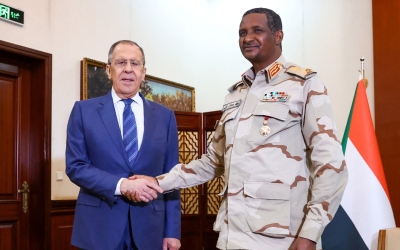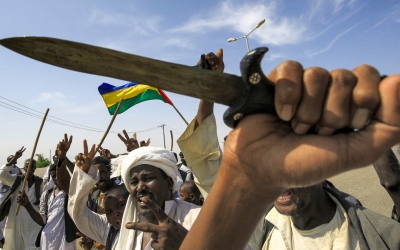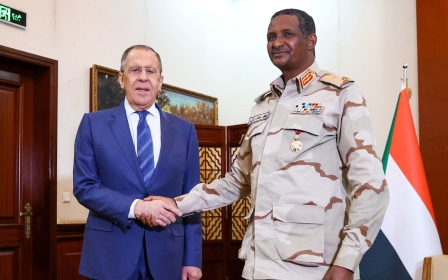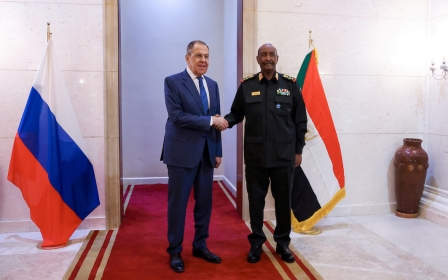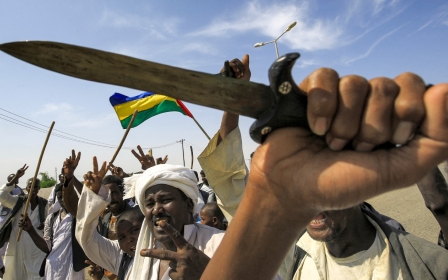Sudan port closures escalate as divisions over framework deal intensify
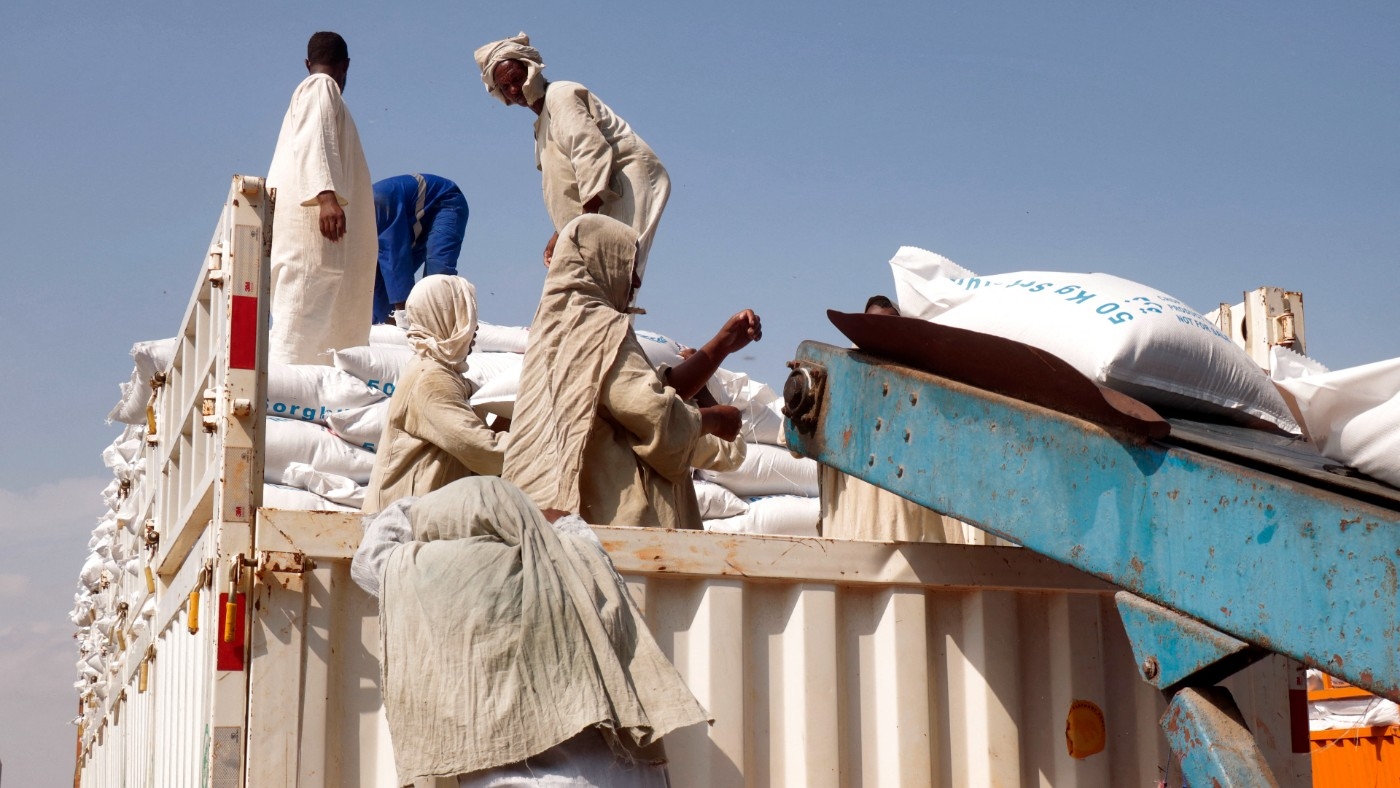
Rival groups in eastern Sudan's Red Sea region are increasingly using port closures as a political tactic as differences over December's framework deal to move Sudan towards democratic elections intensify.
A series of ports in the coastal region, including Bashair one and two, Haidob and the northern and southern ports of Port Sudan have been closed and reopened for different reasons over the past two years.
Sit-ins around Haidob have been held since last August, leading to a full shutdown of the port, which exports livestock, including camels, to China and Gulf countries.
Ninety percent of Sudan's foreign trade passes through Port Sudan on the Red Sea coast, meaning that control of the ports provides enormous influence.
In Khartoum last week, Russian Foreign Minister Sergei Lavrov said that a proposed deal to establish a Russian naval base on the Red Sea coast was waiting to be legalised.
Dirar Ahmed Dirar, an armed leader whose power in eastern Sudan is growing, has threatened further port closures. He told Middle East Eye that the Beja people of the region, to which he belongs, have been marginalised by those in Khartoum for too long.
The port closures, with the threat of more to come, have resulted in panic-induced losses for an economy already in turmoil and have benefited other ports in the region, particularly in Egypt.
Monitors believe that the tactic of using shipping, exports and imports to apply political pressure is threatening security in the centre of Sudan as well as harming the economy.
This comes at a time when bitter differences over the internationally brokered December agreement signed between the military and civilian representatives of the Forces for Freedom and Change coalition (FFC), which aims to pave the way for a transition to elections in two years, are being aired on the streets.
The FFC held a meeting last Sunday, with the help of international brokers, to discuss issues in eastern Sudan.
On the other hand, Sudan's resistance committees, which were at the heart of the 2019 revolution that toppled longtime autocrat Omar al-Bashir and have been leading the opposition to the 2021 military coup, oppose the deal, which they believe leaves too much power in the hands of the military.
Within the military, a game of thrones is under way, with Sudan's de facto leader, General Abdel Fattah al-Burhan, increasingly at odds with his deputy, Rapid Support Forces commander Mohamed Hamdan Daglo, aka Hemeti.
Port threats
Control over Sudan's Red Sea ports is a crucial part of the country's future direction.
Eastern Sudan's Beja high council has repeatedly threatened to close the ports in order to resist the track laid out by the Juba Peace Agreement of 2020, which enabled former rebels from Darfur, South Kordofan and Blue Nile States to participate in the transitional government.
The agreement was rejected by tribal leaders in eastern Sudan because it handed them too little power.
'The closure of Sudanese ports has led to a big flourishing for regional ports in Egypt, Saudi Arabia and even Eritrea and the UAE'
- Shipping official in Port Sudan
Nevertheless, resistance committees and pro-democracy protesters have accused the tribal leaders of supporting the former regime of Bashir and of paving the way for the military coup led by Burhan in October 2021.
Beja leaders recently closed Port Sudan for around two days and threatened to close it for longer in order to resist the December framework agreement.
In a statement, the leaders warned that they might extend the closure to the entire region of eastern Sudan, not just the vital Red Sea coastline.
The Beja group said that the framework agreement neglected their demands and those of eastern Sudan. "We will continue our struggle against this marginalisation," the Beja council said.
A history of closures
Port closures have repeatedly paved the way for the political change in the centre over the past few years.
The first recent closure of Port Sudan was during the protests against Bashir in 2019. It forced Bashir to suspend a deal he had signed with a Philippine company to lease part of Port Sudan.
The closure continued for two weeks in February 2019 and played a significant part in the revolution that toppled Bashir.
The second closure of the ports, in September 2021, played an altogether different political role, eventually enabling the military coup that followed in October.
'The Sea Ports Corporation has promised... houses for citizens, health centres and schools. But that hasn't happened'
- Ohaj Tulab, Kameilab community leader
Tribal figures spearheaded by Beja leader Mohammed Alamin Tirik, who opposed the Juba agreement, shut down the port, leading to a deep economic and political crisis that played into the military's hands.
This third significant port closure is even more complicated. Tribal leaders, headed by Dirar, who is close to Tirik, closed Port Sudan for a few days in order to reject the 5 December framework agreement.
Alawad Mohamed, a union leader at the Sea Ports Corporation, the national port operator, told MEE that the closure of the port could be used to demand better conditions for workers, but added that tribal leaders, the old Islamist regime and the military were using port closures to blackmail pro-democracy leaders.
The politicisation of the issue by tribal leaders serves "the interests of the military and the old regime, by exploiting the importance of the port for the supply of goods, fuel and exports", he said.
China and the Kameilab people
The tactic is also being used to settle land disputes with the government and is being used to apply pressure elsewhere.
Clashes over land between the authorities and the local community pushed the Kameilab people of the Red Sea to shut down shipping in Haidob port, which was built by China Harbour Engineering and is part of China's 21st century maritime Silk Road.
Ohaj Tulab, a leading member of the Kameilab community who haven't been compensated for establishing the port on their land two years ago, told MEE the closure was stopping the export of Sudanese livestock to China and Gulf countries.
Tulab said Haidob port has been closed since August 2022 over disputes with China Harbour Engineering and the Sudanese Sea Ports Corporation, which operates the port.
"The Sea Ports Corporation has promised the citizens of the area, according to an agreement signed with them in 2018, the establishment of livestock stores, houses for the citizens, health centres and schools. But that hasn't happened," Tulab said.
Mohamed Alhassan Mukhtar, the head of Haidob port, told MEE over the phone that the port has earned at least 3-4 million euros ($3.2m-$4.3m) per year from the exports, adding that the income is now being lost.
"There are talks with the people of Kameilab in order to solve the crisis and convince them to lift the sit-in. If they enable us to operate the port well, they will gain more than [from] this long closure," he said.
Massive losses
A former Sea Ports Corporation official said that Sudan was losing $1m per day due to the closure of the container terminals in the southern port of Port Sudan, adding that the number might amount to $2m when the ports of Suakin, Bashair, Osaif and others are closed.
The source told MEE that Sudan would "lose its entire revenue from exports, which will shock the entire economy. This will lead to other consequences, such as a shortage of fuel, wheat and other basic commodities. It will cause deep social unrest."
The head of the Port Sudan branch of an international shipping company said the closure of Sudanese ports would impact their wider reputation.
"We noticed that the closure of the Sudanese ports has led to a big flourishing for the regional ports in Egypt, Saudi Arabia and even Eritrea and the UAE. The regional and international trade won't stop because of the closure of the Sudanese ports," the official told MEE.
Hassan Ali, a Sudanese importer, told MEE that he and his fellow importers are using Egyptian Red Sea ports to bring things into the country while Sudan's ports are closed.
"We used the ports of Nuweiba and Hurghada in order to import the goods, and then transferred them overland into Sudan," he said.
Middle East Eye propose une couverture et une analyse indépendantes et incomparables du Moyen-Orient, de l’Afrique du Nord et d’autres régions du monde. Pour en savoir plus sur la reprise de ce contenu et les frais qui s’appliquent, veuillez remplir ce formulaire [en anglais]. Pour en savoir plus sur MEE, cliquez ici [en anglais].


